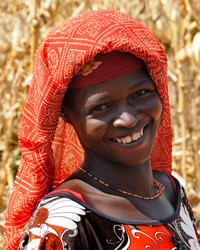Dendi, Dandawa in Benin

Photo Source:
Jacques Taberlet - Wikimedia
Creative Commons
|
Send Joshua Project a map of this people group.
|
| People Name: | Dendi, Dandawa |
| Country: | Benin |
| 10/40 Window: | Yes |
| Population: | 329,000 |
| World Population: | 487,900 |
| Primary Language: | Dendi (Benin) |
| Primary Religion: | Islam |
| Christian Adherents: | 0.07 % |
| Evangelicals: | 0.03 % |
| Scripture: | New Testament |
| Ministry Resources: | Yes |
| Jesus Film: | Yes |
| Audio Recordings: | Yes |
| People Cluster: | Songhai |
| Affinity Bloc: | Sub-Saharan Peoples |
| Progress Level: |
|
Introduction / History
The Dendi live in northern Benin, as well as in Togo, Nigeria and Niger. They are a subgroup of the Songhai people of West Africa and speak a Songhai language. From the Songhai language comes the Dendi name, which means, "down the river." The Dendi trace their origin to the great Songhai Empire of the sixteenth century. Many years ago, the Dendi traveled as merchants throughout the Niger River Valley, selling their goods and services and settling along the principal caravan routes. They eventually become an influential group with significant political influence in regional politics.
What Are Their Lives Like?
In larger cities in Benin, the Dendi form a very powerful commercial elite. Many continue to work as merchants, while others are farmers.
Dendi settlements usually consist of round, mud or thatched dwellings with straw roofs. Today, an increasing number of villagers live in rectangular mud brick houses with corrugated tin roofs. Dendi settlements along the Niger River contain many rice fields and garden plots. Villages farther from the river are surrounded by bush areas and cultivated fields. Cowpeas, groundnuts and manioc are the usual crops, but millet is grown from June to September during the brief rainy season. Farming is considered noble labor among the Dendi and is for men only. The women have gardens in which they grow mangoes, guavas, citrus fruits, papayas, dates and bananas during the hot, dry season. They also cultivate carrots, tomatoes, peppers, cabbages and various types of squash. Most of the garden work is done by family members. In addition to farming, the Dendi also raise some livestock.
The village community is patrilineal, that is, all the men have a common male ancestor. Among the Dendi nobles, firstborn sons are pressured to marry their paternal uncle's daughter in order to maintain the purity of the lineage. Men marry while they are in their late twenties; whereas girls marry while in their early teens. Whether the marriage lasts or not, all of the children belong to the husband's lineage group. Although the Islamic law allows a man to have up to four wives, most Dendi men have only one for economic reasons. When there is more than one wife, each lives in her own separate dwelling within the extended family compound.
What Are Their Beliefs?
The Dendi are almost entirely Muslim. Even though Islam introduced new elements to the Dendi culture, it left the underlying framework of custom and tradition virtually untouched. Islam is superficially important - every town has a mosque, or at least a Friday mosque. Some communities have imams (religious leaders) who teach Islam and perform ceremonies.
Spirit possession, magic, sorcery, ancestor worship and witchcraft remain the vital components of Dendi belief. Most of the villages have possession troops, magician-healers and witches. In some places, ceremonies of spirit possession occur at least once a week. The most important ceremonies are the genji bi hori (a festival in which the Dendi make offerings to the "black spirits" believed to control pestilence) and the yenaandi ("rain dance"). Both of these are held in the dry season. Marabouts (Islamic holy men) lead community prayers but are also used in healing the sick.
What Are Their Needs?
Generally, the Dendi live simple but adequate lives, except in times of drought. Unfortunately, these occur regularly, leaving many children as orphans. Malnutrition is also a problem for many of them. Christian medical teams and humanitarian aid workers are needed to minister to the physical needs of the Dendi.
Currently, there are some Christian resources available in the Dendi language. A majority of these precious people have not heard a clear presentation of the gospel.
Prayer Points
Ask the Lord to send Christian agricultural workers, educators, and doctors to minister to the physical needs of the Dendi.
Pray that Christian radio broadcasts and evangelistic literature will be made easily available to the Dendi.
Ask the Lord to save key leaders among the Dendi who will boldly proclaim the gospel.
Pray the Dendi people will have the spiritual hunger it takes to seek and find the Lord no matter what the cost.